C++ if...else語句
if語句可以跟一個可選的else語句,該語句布爾表達式為假時執行。
語法
C++中if ... else語句的語法是:
if(boolean_expression) { // statement(s) will execute if the boolean expression is true } else { // statement(s) will execute if the boolean expression is false }
if布爾表達式的值為true,那麼if代碼塊將被執行,否則else塊將執行。
流程圖:

例如:
#include <iostream> using namespace std; int main () { // local variable declaration: int a = 100; // check the boolean condition if( a < 20 ) { // if condition is true then print the following cout << "a is less than 20;" << endl; } else { // if condition is false then print the following cout << "a is not less than 20;" << endl; } cout << "value of a is : " << a << endl; return 0; }
當上述代碼被編譯和執行時,它產生了以下結果:
a is not less than 20; value of a is : 100
if...else if...else 語句:
if語句可以跟著一個可選的else if ... else語句,使用單個 if...else ,if語句是非常有用的,以測試各種條件。
使用if , else if , else語句有幾點要牢記。
-
一個if可以有零或一個else,它必須跟從任何else if。
-
一個if可以有零到多個else if,並且它們必須在else之前。
-
一旦一個else if條件成功,其他剩餘else if不在計算,else將被測試。
語法
if...else if...else語句在C++ 語法是:
if(boolean_expression 1) { // Executes when the boolean expression 1 is true } else if( boolean_expression 2) { // Executes when the boolean expression 2 is true } else if( boolean_expression 3) { // Executes when the boolean expression 3 is true } else { // executes when the none of the above condition is true. }
例子:
#include <iostream> using namespace std; int main () { // local variable declaration: int a = 100; // check the boolean condition if( a == 10 ) { // if condition is true then print the following cout << "Value of a is 10" << endl; } else if( a == 20 ) { // if else if condition is true cout << "Value of a is 20" << endl; } else if( a == 30 ) { // if else if condition is true cout << "Value of a is 30" << endl; } else { // if none of the conditions is true cout << "Value of a is not matching" << endl; } cout << "Exact value of a is : " << a << endl; return 0; }
讓我們編譯和運行上麵的程序,這將產生以下結果:
Value of a is not matching Exact value of a is : 100


